|
Report from Olympia | October 2, 2018
 Fall in Green Bluff. Green Bluff Growers is an association of small family farms and food stands. Seasonal activities include pick-your-own fruit and annual festivals such as Blooms on the Bluff, Strawberry Celebration, Cherry Festival Cherry Pickers’ Trot and Pit Spit, Peach Festival, Apple Festival, Holiday Memories.
Dear
Friends and Neighbors,
I realize a change of
seasons doesn’t mean people suddenly have more free time – early fall is no
less busy for most folks than summer. Knowing that, I thank each and every one
of you who made the effort to meet at the Rocket Bakery for my recent coffee conversations.
It was great to directly hear your concerns and ideas for better government.
If you were not able
to attend our coffee meetings, don’t worry. You can call my legislative office
at any time. We want to hear from you!
In the meantime,
please enjoy this issue of my Report from Olympia. In it we discuss the
continuing good economic news that has a record level of revenue coming into
the state treasury. You can also watch video of a recent discussion on school
safety, in which I participated.
Thanks again for the honor
of representing you in the Washington State Senate.
Sincerely,

Senator
Mike Padden

In the News:
By Will Campbell, Spokesman-Review | Sep. 26, 2018

A graduate
of Washington State University [received] the Medal of Honor on Monday at the
White House.
U.S. Army Staff Sgt. Ronald J. Shurer was
serving as a medic with the 3rd Special Forces Group in the Shok Valley of
Afganistan, where his team was fighting key members of Hezeb Islami al
Gulbadin, a militant group battling U.S. and coalition forces.
According to an Army news release, the
Special Forces unit was taking heavy fire from snipers and rocket-propelled
grenades in April 2008 when Shurer moved “through a hail of bullets” to reach
the team. Shurer began treating a soldier’s neck wound inflicted by an RPG
blast, then fought and killed multiple insurgents and provided aid to four more
American soldiers and 10 injured Afghan commandos. A bullet hit his helmet and
he was also shot in the arm, the news release stated. Despite his injury, he
pulled a soldier to cover and treated him.
Shurer then helped evacuate three wounded
soldiers down a 60-foot, near-vertical cliff “while avoiding rounds of enemy
gunfire and falling debris caused by numerous airstrikes.”
Shurer, who is originally from Puyallup,
graduated from WSU in 2001 with a business economics degree and enlisted in the
Army in September 2002 in Spokane. In 2006, he was promoted to staff sergeant
and served with the Combined Joint Special Operations Task Force in Afghanistan
from November 2007 to May 2008.
You can read the full article about this hero by clicking
here.
|

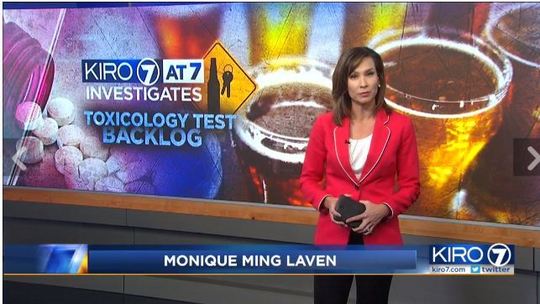 Click here to watch this video now.
Note: This story is about the backlog
of forensic blood tests at the state lab, and the impact it is having on
prosecuting DUIs. The state patrol needs to take measures to greatly reduce or
eliminate this backlog. This is a question of leadership and priorities. Patrol
leadership needs to take DUIs more seriously.
There's
a new problem in the fight to get drunken and drugged drivers off the streets. The
state is struggling with a growing backlog of blood toxicology tests, as more people
are getting pulled over. And now the wait on results for a lab blood test is up
to six months – which impacts prosecutors trying to convict DUI suspects.
The lab
is dealing with a backlog of 6,000 cases, and that backlog is growing.
Getting
blood-draw results is a waiting game for King County deputy prosecutor Amy
Freedheim.
“A year
and a half ago we started noticing a longer time. It was last spring three to
four months, over the summer it has just exploded now to five to six months,”
Freedheim said.
On the
wall of her office - the faces of victims, killed by drivers under the influence.
“I
wanted to remember my victims. Because I never get to meet them. I only know
them through their families,” Freedheim said.
But
when evidence is held up in the lab, Freedheim said that’s a big cause for
concern.
“It can
impact public safety because you've got people who we've got strong suspicion
they're DUI but we're not able to file charges against them,” Freedheim said.
It
means suspects are free to drive under the influence again while families are
left waiting up to a year for a suspect to be charged.
There
are several reasons for the growing caseload.
Freedheim
said as people grow more comfortable with the idea of pot, more are also
getting behind the wheel high, which raises the number of drug DUI’s.
“We’ve
seen for the first time in decades, an increase in impaired driving
fatalities,” Freedheim said.

Booming economy results in updated budget
forecast
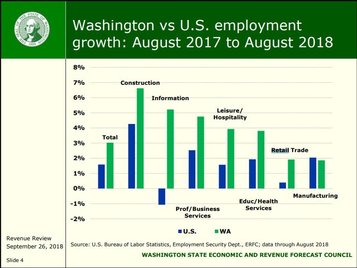
Last week’s
meeting of the Washington State Economic and Revenue Forecast Council saw the
state’s chief economist announce the latest projections involving state
government’s finances: a $348 million increase in projected revenues for the
ongoing 2017-19 budget cycle and another $443 million increase for state government’s
2019-21 fiscal biennium.
The September 2017 forecast projected $44 billion in revenue during the
2017-19 budget cycle. The new numbers, which continue a streak of positive
quarterly revenue forecasts, boost revenues for the same period to $45.6
billion. And it’s a $1.9 billion increase in forecasted revenue over the
projection made in June 2017.
Revenue growth for the current biennium is now expected to be $6.6 billion
(going from $39 billion to $45.6 billion), equal to 16.9% growth this biennia.
Such strong growth, not surprisingly, triggers an “Extraordinary Revenue
Growth” deposit into the state’s constitutional rainy day fund.
All told, revenues are nearly $900 million higher than what was expected when
the 2018 session ended in March. State government is projected to have its highest
reserve level in history at the end of the current biennium, with $3.25
billion.
While this flood of good news continues to pour in, I believe that we
cannot lose sight of some basic economic realities. For one, no economic boom
lasts forever. The last time we saw this level of growth was right before the
economic collapse of 2008.
That being the case, now is not the time to expand government. Now is the
time to think long-term, and make significant contributions to reducing state
government’s long-term pension costs, which will save taxpayers money down the
road.
Legislators also now have an opportunity to reward taxpayers with
substantial relief. The good economic news also includes the fact that state
employment growth recently outpaced national growth in every major category except
one: manufacturing. Providing tax relief for our manufacturers, especially in
rural areas, received broad bipartisan support last year before the measure to
achieve it was vetoed by Governor Inslee. I will be urging my fellow lawmakers
to revisit this issue in light of this new extraordinary revenue growth. Now is
the perfect time to let manufacturers keep more of their own money so that they
can invest in growing jobs and keeping the state economy strong.
To
read the revenue forecast materials for yourself, please click here.
|

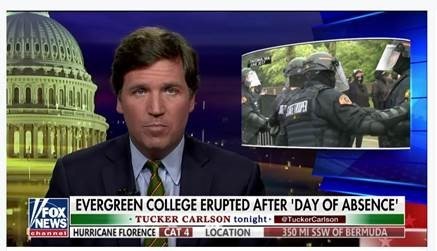 Click here to watch the full report.
The Evergreen State College has been making national news lately –
unfortunately, for all the wrong reasons.
Last month, the Olympia-based school – one of our state-funded
baccalaureate institutions – was featured on a segment of Tucker Carlson’s Fox
News show that highlighted “campus craziness.” According to the segment, freshman
enrollment at Evergreen has plummeted since the infamous “Day of Absence”
unrest in 2017 that included the targeting of now-former professor Bret
Weinstein. You can watch
this report here.
This was followed up by another Fox News
report on September 14 that Evergreen was forced to apologize for using
taxpayer funds to transport students and educators to a protest at a family
farm nearly 180 miles away. Evergreen President George Bridges apologized and
said half a dozen faculty members have been “strongly reprimanded.”
Click
here to read this latest report.

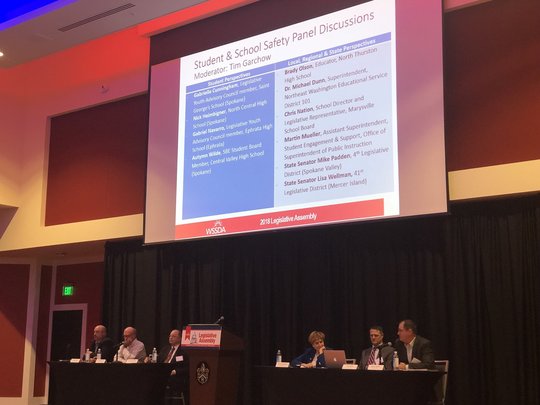
On September 21 and 22, Spokane hosted the
Washington State School Directors Association’s 2018 Legislative Assembly. The
gathering is an annual event, made all the more important because school board
directors vote on and prioritize WSSDA's legislative positions.
I was invited to attend the conference to
participate in a panel discussion on the local, regional and state perspectives
on student and school safety policy. Joining me were:
-
Brady Olson, a social studies teacher in the North Thurston and
Tumwater school districts, who tackled a school shooter in 2015;
-
Dr. Michael Dunn, superintendent of NorthEast Washington
Educational Service District 101 since July 2008;
-
Chris Nation, a member of the Marysville School Board of Directors
since 2009;
-
Martin Mueller, assistant superintendent of student engagement and
support at the state Office of Superintendent of Public Instruction (OSPI) for
the past three years, who has over 20 years’ experience implementing and
overseeing student health, safety, and support initiatives; and
-
Sen. Lisa Wellman, my colleague in the state Senate, who
represents the 41st Legislative District and serves on the board of Thrive
(focused on early childhood education).
I discussed Senate
Bill 6410, my bill that would have required first responders to
notify public and private schools during any situation in their vicinity that
would warrant an evacuation or lockdown. The bill would have also created two
school-safety centers – one in eastern Washington and one in western
Washington. While the bill unanimously passed the Senate, it stalled in the
House. Fortunately, we were able to get support for the change into the budget
as a proviso – meaning it is good for a couple of years. We will need to go
back and codify it again next session.
To watch our full panel discussion, click
here or on the image below.
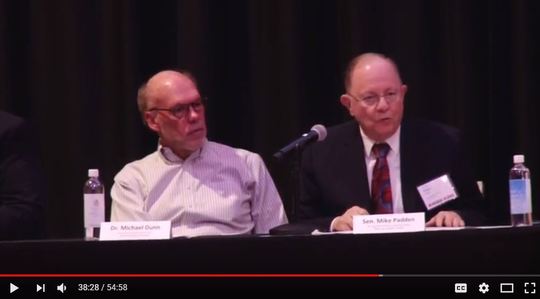 Click here to watch our panel discussion.
* * *
|




















